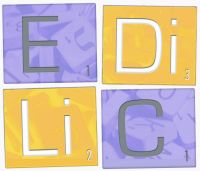Speaker
Description
Dans un contexte formel d’apprentissage du FLE, je partage avec des étudiants plurilingues et pluriculturels des ateliers d’écriture créative, que je situe « comme une approche sensible, avec en texte ou en sous-texte, la narration de l’expérience des sujets, plurilingue et plurilocalisée ». Ma recherche vise à « montrer comment les ateliers peuvent […] proposer un chemin productif pour l’appropriation de la langue autre et plus peut-être » (auteure, 2023 : 31). C’est dans ce "plus peut-être", intentionnellement flou, comme le sous-texte, que se niche la déclinaison de la notion de littératie plurilingue discrète que je tente d’élucider.
Loin d’un “plus/mehr/more” quantitatif, ma démarche m’a emmenée vers une acception qualitative et holistique du gain à attendre dans les habiletés des participants à l’atelier. Ainsi j’ai remis en question une intention de faire produire des textes dont la plurilingualité serait très visible et de l’ordre du cumulatif. Plus que l’expression d’une « identité plurilingue » (Matthis, 2014), j’encourage aujourd'hui la mise en mots subjectivante de l’expérience plurielle, sachant que l’étudiant cherchera graduellement à gommer les traces ou « bouées transcodiques » (Moore, 1996).
Je présenterai une réflexion en cours, m’appuyant sur un corpus de textes et une enquête auprès d’étudiants, avec lesquels j’ai travaillé la notion d’identité et les questions de langues afférentes. Les échanges sur la variation en français semblent par une sorte de détour (le focus n’est pas sur les langues de leur répertoire) stimuler une créativité tolérante au(x) mélange(s), booster la liberté d’expression et (r)ouvrir les portes d’un translanguaging tranquille (Cenoz & Gorter, 2020 ; Cavalli et Egli-Cuenat, 2024). L’enquête porte sur leur relation aux variations et à la norme en français, leur relation au(x) mélange(s) de langues et leur représentation du développement de leurs habiletés langagières transverses à l’occasion de leur appropriation du français.
References
Auteure (2023). XXXXX [HDR]
Cavalli, M. et Egli Cuenat, M. (2024) « Translanguaging – effet de mondialisation ou de domination ? », Recherches en didactique des langues et des cultures 22-2 | 2024, http://journals.openedition.org/rdlc/13796 ; DOI : https://doi.org/10.4000/11qab
Cenoz J, Gorter D. (2020) Teaching English through pedagogical translanguaging. World Englishes. 39:300–311. https://doi.org/10.1111/weng.12462
Mathis, N. (2014). Pratiques de littératies en atelier d’écriture plurielle : une fenêtre ouverte à l’expression d’identités plurilingues. Spirale 53.
Content/contenu/Inhalt 2
In a formal learning context of French as a Foreign Language, I share with plurilingual and pluricultural students some writing workshops, which I design “as 'sensitive' approaches, with in text or subtext, the narrative of the subjects' plurilingual and plurilocalized experience”. My research aims to “show how workshops can [...] propose a productive path for the appropriation of the other language and maybe more” (author, 2023: 31). It is in this intentionally blurred ‘may be more’, or the notion of subtext, that nesles the idea of discrete evolution ot plurililiteracy.
Far from a quantitative “more/mehr”, my approach took me towards a qualitative and holistic understanding of the language "plus" to be expected in the skills of workshop participants. Along the way, I questioned the intention to have them produce texts with highly visible, hence cumulative, plurilinguality. More than the expression of a “plurilingual identity” (Matthis, 2014), I encourage subjectivization by the wording of plural experience, knowing that the student will increasingly seek to erase traces or “transcodic buoys” (Moore, 1996).
I'll be presenting a reflection in progress, based on a corpus of texts and a survey with a small number of students with whom I've been working on the notion of identity and related language issues. Exchanges on variation in French seem, by a sort of detour (we do not focus on the languages of their repertoire) to stimulate tolerant creativity, boost freedom of expression and (re)open the doors to a quiet translanguaging (Cenoz & Gorter, 2020; Cavalli and Egli-Cuenat, 2024). The investigation focuses on their relationship to variations and norm in French, their relationship to the language mixing and their representation of the development of their transversal language skills on the occasion of their appropriation of French.
| Title/ titre/Titel 2 | Beyond languages, a plurilingual literacy that's quietly evolving |
|---|

